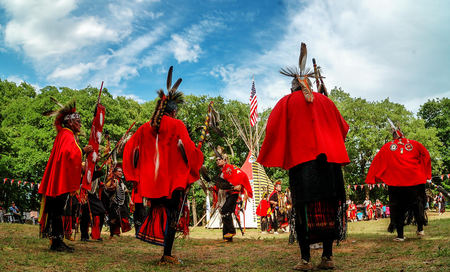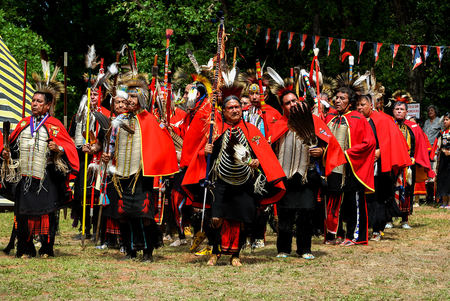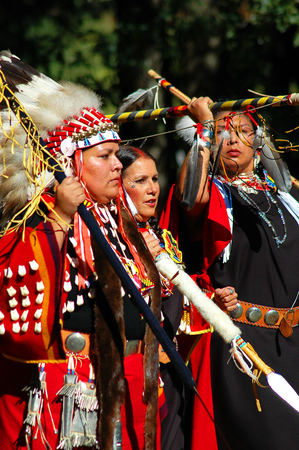Columbus Day weekend for Native Christians in Oklahoma is full of opportunities for fellowship and community in the midst of indigenous traditions. Indian communities all across Oklahoma and the country held ceremonies to honor their cultural heritage, their relatives, and their tribes, as well as to celebrate their faith. Two such gatherings included the Chiricahua Apache Ceremonial and the Kiowa Black Leggings Ceremony. These ceremonial activities are fitting with the newly determined observation of Indigenous Peoples Day (in lieu of Columbus Day). This year, the graduate student senate at the University of Oklahoma voted unanimously to celebrate "Indigenous Peoples Day."
The sacred Chiricahua Apache Ceremonial included the White Mountain Sunrise Dance, the Mountain Spirit Dance, and the Apache Fire Dance. The Sunrise dance signifies the transition of a girl into womanhood. The Mountain Spirit dance involves the men in the tribe wearing crows and masks as they impersonate the spirit of the mountains. All of the tribal dances included a large fire burning at the center of the gathering. The celebration lasted from October 8 through October 11 this year and family and relatives from across the country traveled to Apache, Oklahoma to participate.
The Kiowa Black Leggings Ceremony is an annual tribal ritual held on the grounds of Indian City USA in Anadarko, Oklahoma. The ceremony, which has been historically practiced for more than 200 years, honors veterans of the tribe who served in the United States armed forces and includes traditional dancing, a presentation of the colors, dance festivities, including the scalp dance, victory dance, and war songs. During this year's Kiowa ceremony, Harold Barse, a veteran from the Vietnam War, said, "Native Americans are the most patriotic and generous people you will ever find." This was exemplified in the activities of the event which included a prominent ritual around the American flag and several give-aways as members of the tribe were honored.
Kiowa warriors were called "black leggings" because when the war parties would go out to fight in the south central plains, they would hide in the underbrush to avoid detection by their enemies. The enemy tribes would then light the prairies on fire to try to smoke out the Kiowa fighters. The Kiowa hid to avoid being discovered, but when they returned home they would have to travel through the charred brush that had been burned. When they arrived back to camp, their legs would be black with the soot and ash of the burned prairies. The Kiowa Black Leggings Warrior Society, known as the Ton-Kon-Gah, were fierce and proud horse mounted fighters.
Interestingly, many of the members of the Black Leggings Society are Christians. As followers of Jesus, they see their participation in the traditional ceremonies of their people as a means by which they have the opportunity to connect with God. Prayer was incorporated into the ceremony and a blessing was given to one of the warriors who received a new headdress. Throughout the several hours of the ceremony, stories were told and there were periodic breaks to make announcements or encourage people to join a church or Gospel music event. The ceremony culminated in a chant with drums increasing in intensity as the warriors turned around and danced back and forth, as if reenacting the scenes of a battle.
The haunting chants were led by head singer, Joel Fish DuPoint, an elder in the drum circle, who thanked God for giving him the gift of remembering his tribes' traditional church hymns and songs. He said, "There is spirituality in this music -- this is our music -- and the spirit in these songs, it moves you..." He continued, "This is the only thing I can leave you all... I can't take it with me when I go... but I want to give you the gift of these songs so that all we are as Kiowas will live on."
The Norman First American United Methodist Church believes the integration of the old ways further enhances the body of Christ's worship of Jesus. Steve Barse, a prominent church member says, "We encourage people to have a spiritual relationship wherever they can experience a connection with God - in the teepee, the sweat lodge, the sanctuary, or wherever there is an open door." He continued, "When we practice our faith through our traditional beliefs, we are living Jesus' Gospel message." The Norman First American United Methodist Church has committed to creating space and opportunity for indigenous people and the broader community to benefit from the beauty and richness of traditional worship and spirituality. They are launching a Global Center for Indigenous Dialogue and Community Building and are welcoming partners to come alongside their vision to integrate Indian spirituality with more contemporary traditions that worship Christ.



